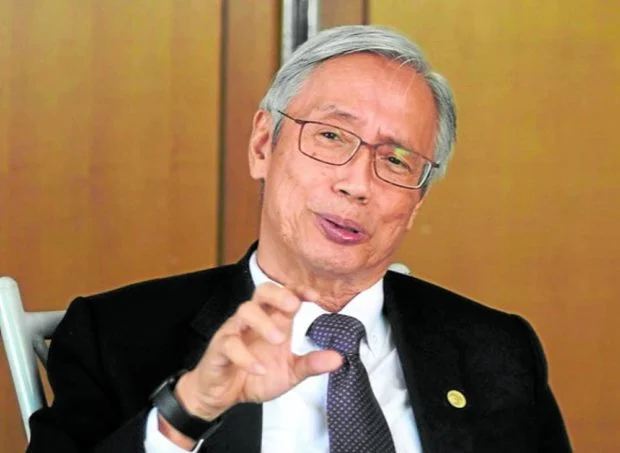Maharlika more acceptable now – BSP chief
By: News Inquirer
Source: newsinfo.inqurer
BSP Governor Felipe Medalla. (Photo from the Facebook page of the Bangko Sentral ng Pilipinas)
MANILA, Philippines — Bangko Sentral ng Pilipinas (BSP) Governor Felipe Medalla sees the Marcos administration’s plan to set up a sovereign wealth fund as “more acceptable,” now that it clearly will not dip into the country’s foreign exchange reserves, while safety nets will be set in place to handpick quality investments.
On the sidelines of a reception he hosted for the banking community on Friday night, Medalla told reporters that the proposed Maharlika Investment Fund (MIF) — which has been criticized by big business and civil society groups — was shaping up to be more acceptable, especially as it already aims to bring in “credible” external partners.
“[The best route] is if they get multilateral [institutions and] highly reputable investors, and I think they are already moving in that direction,” said the BSP chief, who himself had earlier expressed reservations about the fund.
Asked whether he thought that multilateral institutions would be interested, Medalla said that while he could not speak for them, “if some of the investments are meant to reduce carbon emissions, they will actually be part of it.”
He noted, for example, that projects to bring down greenhouse gas emissions would likely be attractive to multilateral investors.
“They probably are waiting for the fund to meet their own requirements,” he said, adding that a “more focused spending” plan would also be good.
‘Very good benefits’
Economist Romeo Bernardo had proposed opening the MIF to multilateral organizations such as the Asian Development Bank (ADB), International Finance Corp. (IFC) and the Asian Infrastructure Investment Bank (AIIB), as well as private investors, as a “straightforward” way to address governance concerns.
This could allow the government to multiply the size of the fund from just P100 billion, said Bernardo, a former finance undersecretary during the Ramos administration who is now part of New York-based think tank Global Source.
The ADB believes the creation of the wealth fund can further strengthen the domestic capital market.
In an earlier briefing, ADB country director Kelly Bird said it was up to the Philippines to decide on establishing such a fund.
He said the fund may also help “create…a large institutional investor, and that allows mobilization of savings within the economy for investments and so on. So it does have very good benefits.”
Senate scrutiny
Medalla noted that Senate President Juan Miguel Zubiri now seemed to be thinking along the lines proposed by Bernardo.
He said the conceptualization of the MIF has become more justifiable “because it’s very clear that [foreign exchange] reserves will not be a target for the funds. It’s very clear that our regulations will not be affected.”
Under House Bill No. 6608, the bill creating the fund, the Land Bank of the Philippines will contribute P50 billion and Development Bank of the Philippines, P25 billion.
The BSP, on the other hand, will be required to turn over 100 percent of dividends to the national government, which will then invest it in the MIF.
Pension funds Social Security System (SSS) and Government Service Insurance System (GSIS) had been dropped from the list of contributors as the proposal drew flak from the public.
Also scrapped was a proposal to use part of the BSP’s foreign exchange reserves—the buffer kept by the central bank to pay foreign debt, imports and other external obligations—as seed money for the fund.
In the case of Landbank and DBP, Medalla said these government financial institutions would just have to transfer their budget for securities investments to the MIF.
“It’s not even affecting [their] lending. Of course, one can argue that if DBP and Landbank used the money that they were initially planning…to buy government securities, now the national government will have to find new buyers,” he said.
During deliberations early in February by the Senate committee on banks, financial institutions and currencies, Foundation for Economic Freedom (FEF) president Calixto Chikiamco said the MIF would be acceptable as long as the seed money would not come from the BSP and government-owned banks.
He suggested that the initial funding come from the government, “and then, there will be co-investment” from multilateral and foreign investors.
Earlier concerns
Asked about prospects of the MIF getting credible investors, Medalla said: “It has gotten to the point when they are now focusing on the quality of spending and, in fact, their biggest goal now is to get credible partners, not [do] an IPO (initial public offering).”
The IPO route had been proposed by one of the bank CEOs who attended briefings on the MIF.
Senate Minority Leader Aquilino “Koko” Pimentel III had also questioned some contradictory details in the proposal.
The supposed assurance that there would be a list of allowable investments did not accord with the phrase, “and all other investments as may be decided by the board,” Pimentel said.
‘Vigilance is reduced’
Medalla at first had reservations about the fund, arguing that it was important to place safeguards.
“My own concern is later on, the vigilance is reduced. This is actually the case of Malaysia…. So my main concern really is what happens in the long run,” he said then, referring to 1Malaysia Development Berhad (1MDB), the state fund rocked by a multibillion-dollar graft scandal.
Lawmakers opposing the MIF also cited the 1MDB fiasco which led to the conviction of former Malaysian Prime Minister Najib Razak.
The MIF had a soft launch in Davos, Switzerland, on the sidelines of the World Economic Forum in January and drew “substantial” interest—and concern, too—from global investors.
But President Ferdinand Marcos Jr. kept the door open for new suggestions on how to customize the proposed fund to the country’s needs.

